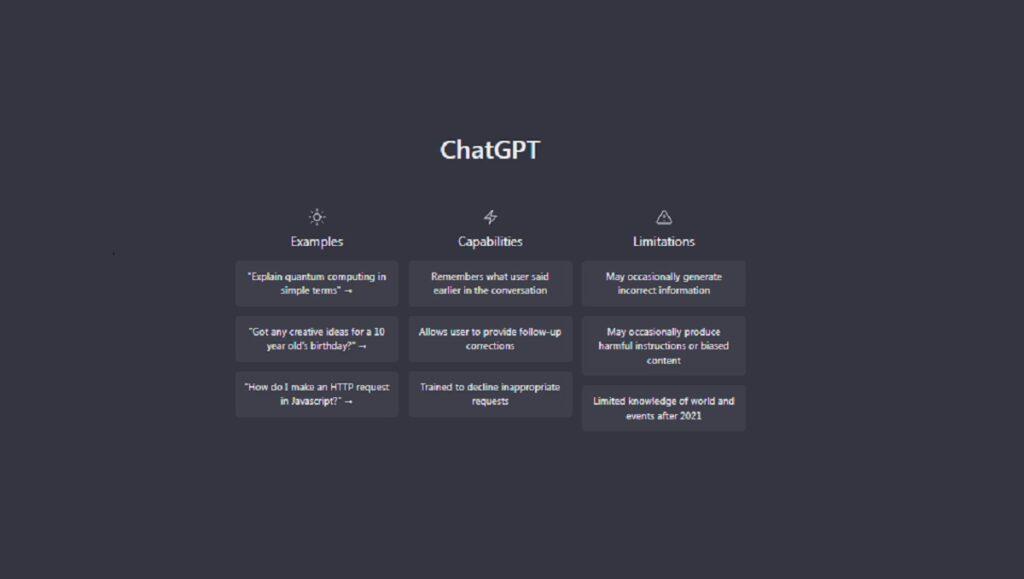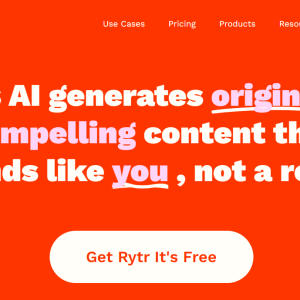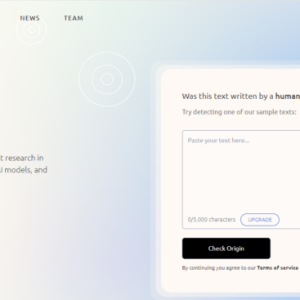Chatbots have revolutionized the way we interact with technology, and OpenAI’s ChatGPT is no exception. With its advanced natural language processing capabilities, ChatGPT can be a valuable tool for bloggers looking to enhance their content creation process. Whether you’re looking for inspiration, need help with research, or want to improve the overall quality of your blog posts, ChatGPT offers 15 great and helpful ways to take your blogging game to the next level. In this article, we will explore the various ways in which ChatGPT can assist bloggers in generating engaging and informative content, ultimately helping them establish a strong online presence.
ChatGPT (Generative Pre-trained Transformer) is a language model designed to chat in a conversational manner; ChatGPT is on everybody’s lips lately. How to use ChatGPT for blogging is usually the first question people think of. This article will give you some ideas, and I will also point out a few other tools that may help you.
You are viewing: 15 Great and Helpful Ways You Can Use ChatGPT for Blogging!
ChatGPT is a chatbot. It is the primary tool for brainstorming today, and before I forget, it is free – for now.
Here are a few facts about ChatGPT: It was launched in November 2022 by OpenAI, trained on top of GPT-3.5, and its knowledge is limited to events up to 2021.
Sam Altman, CEO of OpenAI, was behind the development of ChatGPT. And no, Elon Musk does not own ChatGPT; he was only involved at some stage with OpenAI. Joseph Weizenbaum did not create ChatGPT either – he was a professor at MIT and is considered one of the fathers of artificial intelligence.

The Latest News: ChatGPT in Real Time with WebChatGPT! This open-source extension adds current and relevant web results to ChatGPT’s answers for more accurate and up-to-date conversations.

Now let’s get back to how you can use ChatGPT for blogging.
15 Ways You Can Use ChatGPT for Blogging
Chat GPT has been trained to participate in conversations using the Reinforcement Learning through Human Feedback (RLHF) technique. It is your task to instruct ChatGPT creatively, try and retry till you get results that you are happy with, and then use Grammarly, the Hemingway editor, and an SEO tool like Semrush whenever you need to.
ChatGPT can help with ideas for titles, generate content and blog post ideas, help with keyword research, and generate FAQs (and you can even use ChatGPT for email marketing). It can also write articles and even write Schema for your FAQ section.
Other tools available from OpenAI can generate images for your blog and plugins for your website, but we will just be discussing ChatGPT in this article.
Content Strategy
Content strategy encapsulates your business goals, objectives, target audience, and includes your content plan. A well-defined and implemented content strategy can help to improve brand authority, generate leads, and increase sales.
1. Content Planning
Content planning is an important part of positioning yourself as an expert in your niche. By consistently providing valuable content, you can establish yourself as a credible and reliable source of information in your industry, ultimately leading to increased brand loyalty and authority status.
To build out your content, I suggest the following steps in terms of addressing content gaps:
- Make a list of keywords already covered by your articles.
- Sort the relevant keywords into clusters.
- If you find weak clusters with insufficient articles, ask ChatGPT to suggest more relevant keywords for that cluster.
- Go through the process of writing the articles with ChatGPT (this is just one of your options for how to make money with ChatGPT).
Note: Remember to check the keywords with an SEO tool and fact-check all the generated text.
2. Keyword Research
ChatGPT can help you with long-tail keyword research to use in your new blog posts and improve your organic search engine traffic (check out our list of cool and creative uses of ChatGPT for more ideas).

You must check the keywords with an SEO tool like Semrush or Ahrefs. The training data for ChatGPT does not include keywords metrics.
Find out more about relevant keywords, backlinks, and ranking in this Ahrefs review. And here, you can read about Semrush’s Keyword Magic tool.
3. Keyword Clustering
As we saw, you can get ChatGPT to generate keywords. Then, since it remembers your conversation, you can ask it to cluster the keywords.

4. Finding Search Intent
This AI assistant can help you if the search intent behind some keywords needs to be clarified.

Writing Blog Content
Given the right input, you can get ChatGPT to write a whole article for you. I suggest you follow your usual process of writing a blog post and ask ChatGPT for suggestions and help at any stage, for instance:
- Blog post title
- Outline
- Introduction
- Sub-headings
- Blog content
- Conclusion
Note: Don’t forget about on-page SEO (refer to the “ChatGPT and SEO for Content Writing” section of this article and for further reading, check out our list of ways to use ChatGPT for SEO).
Your instructions must be detailed enough for ChatGPT to understand you better. You will find that ChatGPT is always eager to help!
Let’s go over a few examples.
5. Blog Post Title
You will need a catchy title for your blog that includes the keyword. I instructed ChatGPT to use the keyword “ChatGPT for Blogging” and got the results below.

As you see, not all titles include the exact keyword, but ChatGPT does a pretty good job!
6. Blog Post Outline
Now you can ask the AI tool to generate ideas for an outline.

You would need to optimize the outline for SEO (according to the section “ChatGPT and SEO for Content Writing” below).
And if you need some help, read our article on how to write a blog post outline.
7. Introduction
You can ask ChatGPT to compose an introduction based on your blog title examples and include the keyword in the first or second sentence.

8. Content
Now that you have an outline, you can get ChatGPT to expand on each section. Remember to tell him what keywords need to be included and how long you want each piece to be.

In the same way, you can get ChatGPT to write the rest of the blog post.
9. Conclusion
See more : Jasper vs Writesonic: How Do These 2 AI Tools Compare?
Having written the body of the post, you can ask ChatGPT to write a conclusion.
10. Image Ideas
Ask for ideas, for example: “Can you provide three image ideas for each heading of the above blog?” (To illustrate this, we’ll just ask for ideas for one section.)

And if you want to try another new tool, use DALL-E 2 to generate your images.
DALL·E 2 is a new AI system that can create realistic images and art from a description in natural language.
In my opinion, DALL-E 2 is an incredible tool for generating images for a blog post. Its cutting-edge AI advanced technology can create unique and captivating images that will help your blog stand out.
Just imagine: you give DALL-E 2 a text description of the image you want, such as “a photo of a young man hiking in the mountains” or “a painting of a group of friends having a picnic under shady trees,” and it will generate an image that matches that description perfectly. This means you can rely on something other than stock images, which are often overused. And you can have images that are truly unique and fit the style of your blog.
Also, DALL-E 2 allows you to be really creative and make images that might not have been possible with traditional methods. The powerful software can help you create beautiful images to convey the message of your blog post.
In short, DALL-E 2 is a game-changer for creating images for a blog; it can help you create truly unique and captivating photos and convey your message more powerfully.

11. Using Copywriting Frameworks
Copywriting frameworks are a set of techniques and strategies used by copywriters to structure and present information to effectively communicate the intended message to the target audience.
These frameworks provide a step-by-step writing process for organizing and presenting information, from capturing attention, arousing interest, creating desire, and prompting action. Examples of copywriting frameworks include AIDA, PAS, USP, Soap Opera Sequence, Monomyth, and more.
The framework selection depends on the message and the audience you are trying to reach. It helps make the message more relatable and keeps the audience engaged, making it more effective and persuasive.
Note: The three paragraphs above are AI-generated content. Originality.AI classified it as 100% original, but it had some grammar errors. I corrected the errors with Grammarly, and it is now classified as 94% original. No doubt ChatGPT is powerful, as you can see!
As for writing copywriting frameworks, here is an example.

12. Writing the Meta Description
Now you can ask for interesting ideas for meta descriptions for the above blog to attract more traffic from search engines.

If the meta descriptions are too long, you can ask it to read them and rewrite these to be at most 160 characters long.

Or initially ask ChatGPT to stay under 160 characters.
13. Creating a WordPress Schema
Say, for example, you have the following question in a FAQ section.

You can ask the AI assistant to write the FAQ Schema for the same question.

The example written by ChatGPT passes the Rich Results Test.
Promoting Your Blog
Promoting your blog is essential to building an audience and driving traffic to your website. Share your new blog posts on social media platforms like Facebook, Twitter, and Instagram and engage with your followers.
Remember to also promote your blog through guest blogging on other websites in your niche. This can help you get a new audience and establish yourself as an authority in your field.
SEO tactics such as keyword research and meta tags can help your blog rank higher in search engines, making it more visible to potential readers.
14. Promoting on Social Media
With Chat GPT, you can create all the promotional material for social media, from Twitter to FaceBook.


Or for a promotion email, you can ask the tool to: Create a promotional email for my blog “Becoming a Pro Blogger with ChatGPT: Best Practices to Follow.”
15. Writing a Newsletter
And you can get ChatGPT to write a short newsletter.

ChatGPT and SEO for Content Writing
Let’s assume you have a list of competitors with relatively low DA/DR on the first page of Google that you hope to beat.
By now, you know that ChatGPT can suggest most of the information needed to write a blog, but it does not take the SERP into consideration. We can’t count on the outline suggested by ChatGPT.
We need to know the best structure for our article based on what our competitors have, for example:
- Number of H2s and H3s (H4, H5, H6 are not as strong signals)
- Density of exact keywords, LSI, NLP words
- Keywords used in headings
- The structure of sections
Surfer SEO, on the other hand, gives us most of this information, but as much as it tries to break it down for us, it misses important points.
PageOptimizer Pro covers the points missed by Surfer, but it can sometimes be confusing.
It is beyond the scope of this article to get deep into statistical calculations, but here is a list of Youtube videos that will help you.
- ChatGPT Full SEO Tutorial [Best Workflow for 2023]
- On-Page SEO Hack For ELITE Optimization
- SEO Content Writing For Google Rankings
- How to Rank Higher on Google
See more : 100+ ChatGPT Prompts to Scale Your Marketing Campaigns
At this stage, you should have the right outline and additional necessary information.
Now you can start utilizing the power of ChatGPT: ask for headings and specify exactly what keywords should be included. Ask for an introduction and paragraphs and specify exactly what should be included.
If you follow these steps (which is not an easy or fast exercise), you should have the perfect article.
Additional Resources
Latest News: Try the new ChatGTP SEO Extention – AIPRM for SEO. With this extension, you can do things like create a keyword strategy and even generate SEO-optimized content to outrank your competition. This video explains some of its features: How To Rank First Page Google With ChatGPT SEO Extension (New Strategy 2023).
Here are a few additional programs and chrome extensions that may help you:
- Thruuu – paid or free. It is used for scraping the top 10 up to the top 100 articles on the SERP. Thruuu will give you the number of words, H1, H2s, H3s, number of images, and more for each article that it can scrape.
- SEOquake – Semrush chrome extension
- SEO Pro Extension
Bonus Tips on How to Use ChatGPT for Blogging
Keep in mind that while ChatGPT is a powerful tool, using it does not mean you can neglect the human touch. You should always review the content generated by the model and add your personal touch.
Domain Names
Catchy domain names are essential for any website – they help you stand out from the crowd and attract attention.
ChatGPT can help you generate a list of ideas for your next domain name. For example, you can ask for ten domain names for a site dedicated to “How to Use ChatGPT for Blogging.”

Of course, you must check availability.
Generate Ideas
As we’ve seen, ChatGPT can be used to generate content ideas. But you can also use it to generate ideas for:
- High-quality product reviews that will help you monetize your blog.
- Persuasive sales copy that will encourage your readers to make a purchase.
- Infographics that will make your content more engaging and shareable.
- Video content that will increase engagement and drive traffic to your blog.
Sentiment Analysis
Sentiment analysis is important to bloggers because it allows them to understand how their audience reacts to their content.
By analyzing the sentiment of comments and social media posts, you can gain insights into what your readers like and dislike and then use this information to create more engaging and relevant content.
Additionally, sentiment analysis can help you identify potential issues or concerns your readers might have so you can address these promptly.
Overall, sentiment analysis can help you improve engagement with your audience and better understand readers’ needs and preferences.

Convert YouTube Videos to Blog Posts
A few applications, like Jarvis, can help you with this task. But you can also do it manually using ChatGPT. Let me show you how.

- Go to your video on YouTube and click CC to enable captions.
- Click on the three dots and then on “show transcript.”

- Click on the three vertical dots to disable Time Stamps.

- Select all the transcript text, and copy and paste it into the editor of your choice.
- Divide the content into logical paragraphs.
- Ask ChatGPT to rewrite each paragraph (you can ask for a few versions) and suggest a few headlines.
- Do some formatting, and your blog is ready.
Note: During my research for this article, I discovered an extension, “YouTube Summary with ChatGPT,” that will summarize a video.
Rewrite Old Content
Here are several ways to improve old content with the ChatGPT AI tool:
- Rewrite paragraphs or certain phrases and add new ideas.
- Change the tone.
- Update the information: Ensure all the post’s information/data is still accurate and relevant.
- Add new information: If there’s further information or research on the topic, include it in the post to make it more valuable to readers.
- Update meta descriptions if needed to improve the post’s visibility.
- Use social media to promote the post again: Share the post on your social media channels to reach a new audience or even your old followers.
- Use the post for email marketing: Use the post as an opportunity to provide value to your email subscribers and promote your blog.
- Use the post as pillar content and expand it by creating more content around it, such as writing blog posts, videos, podcasts, etc.
In summary, update old content by adding new information.
AI Detection Software

AI-generated text detection uses artificial intelligence (AI) algorithms to identify or classify text generated by a machine or computer. You can use such a utility to detect fake news, identify plagiarism, or filter out automated spam messages.
The technology is based on ML, which allows it to improve its performance over time as it is exposed to more examples of AI-generated text. AI-generated text detection aims to accurately identify machine-generated text and distinguish it from human-generated text.
Applications for the detection of AI text are:
- Originality.AI
- GPT-2 Output Detector
- GPTZero
- Giant Language model Test Room
Those tools still need to be proven.
Every way to spot AI-generated text becomes outdated very quickly. It’s an arms race – and right now, we’re losing.
During my tests, I found that tools generated to detect GPT-2 were very reliable in detecting code generated by ChatGPT. But let’s remember ChatGPT is not Open AI in which one can change parameters like Temperature and Frequency.
Originality.AI is still in beta and was sometimes confused, giving false positives. I had only to add one or two characters to a paragraph of about 100 words, and AI content was reassessed as original content.
Google’s Position on AI
As a blogger, you should be interested in Google’s opinion. Google is sending mixed messages, and for now, “Google does NOT seem to reduce organic traffic to a piece if you use more or less AI to help you write it.” according to Gael Breton from Authority Hacker.
Soon we will really be able to judge Google’s position on AI-generated content. Matt Diggity, the creator of The Affiliate Lab course, said in his video “How ChatGPT has Changed SEO Forever” that he built a whole site using AI. He will disclose the results in one of his future videos.
Note: If your content is detected as AI, try a rewrite in the writing style of Dale Carnegie, Mr. T, or some other celebrity.
In Closing: How to use ChatGPT for Blogging
As we have seen, there are endless ways bloggers and content creators can use this AI tool for inspiration. From generating ideas and outlines to writing blog posts, ChatGPT is a powerful tool that can help you save time and increase productivity.
The 15 tactics we’ve discussed here (and the bonus tips) can help you make the most of ChatGPT’s capabilities and grow your blog in the writing process. Whether you want to improve your SEO, increase your traffic, or writing entire blog posts. ChatGPT is a versatile tool that can help you achieve your blogging goals.
Just ask this AI chatbot, and he will help you!
My advice? Embrace, experiment, and step confidently forward into the future!
That concludes the article: 15 Great and Helpful Ways You Can Use ChatGPT for Blogging!
I hope this article has provided you with valuable knowledge. If you find it useful, feel free to leave a comment and recommend our website!
Click here to read other interesting articles: AI
Source: wubeedu.com
#Great #Helpful #Ways #ChatGPT #Blogging
Source: https://wubeedu.com
Category: AI





